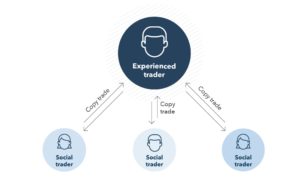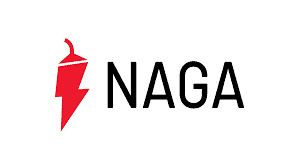Social Trading UK Guide 2024
Trading can feel like a lonely activity sometimes, but it doesn’t have to be. With social trading, you can interact with fellow traders from throughout around the world. Social trading in the UK especially has exploded in popularity in recent years.
Social trading has advantages beyond just making trading more fun. It can also be a great way to learn new trading strategies and gauge the market’s excitement about a particular asset.
If you’re thinking about trying social trading in the UK, this guide is for you. We’ll the basics of trading social networks and review social trading platforms you can get started with today.
What is Social Trading?
Social trading is a type of trading in which you get to interact with and learn from other traders. Those traders can be your peers as well as professionals who can serve as role models.
The idea behind social trading in the UK is that you can learn from others. With a social trading platform, you can share updates about your own trades, explain your decision-making or ask other traders about theirs, or comment on a trade to give kudos or start a discussion.
How Does Social Trading Work?
Social trading in the UK works much like any other popular social network. Except instead of sharing photos or status updates, participants in a trading social network share trade data.
Following Other Traders
To get started with a trading social network, the first thing you need to do is find other traders to follow. Many popular social trading platforms have a discovery feature that surfaces traders you might like to follow based on the industries or assets you trade. You might also see top earning traders, who are some of the individuals on the network who have a good track record of winning trades.
Every trader has their own profile page, so you can easily follow up to learn more about any trader you’re considering following. The profile page might offer some background about the trader, such as whether they’re a hobbyist, part-time trader, or professional, what types of assets they prefer, and what trading strategies they use.
Importantly, you’ll also be able to see their current portfolio of positions and their history of trades. You can’t see how much money any individual trader has, but you can see their percent return for any trade along with how much of their total portfolio a single position represents.
News Feed and Comments
Once you’ve followed a handful of traders, updates from these traders will appear in your personalized news feed. This is usually a chronological feed of new trades, comments, and other activity happening on the trading social network. It’s a handy way to stay up to date with what other traders are buying and selling, which might give you ideas about trades of your own.
Another key aspect of social trading apps is that they are interactive. Other traders can follow you once you establish your profile. You can also comment on other traders’ activity. For example, you may want to congratulate another trader on a winning position or ask more about how they decided to enter that position.
Social trading in the UK can be a suitable way to get more information about trading strategies or to hear other traders’ thoughts on a company. Comments are public, so frequently other traders will weigh in. It’s relatively accessible to spark a thoughtful discussion about the merits of a particular asset or trading strategy.
Gauging Market Sentiment
One additional feature that popular social trading platforms offer is the ability to gauge market sentiment around an asset. On social trading networks, data about traders’ open positions is gathered from across the platform. The result is that you can see what percent of traders are buying or selling that asset and factor that into your trading decision.
Copy Trading

Copy trading can be useful for beginner traders in particular. Simply find a more experienced trader with a winning track record and a risk tolerance that’s similar to your own. Then set up copy trading and sit back as the more experienced trader does the hard work of finding trading opportunities and interpreting market signals.
Even better, you can commit as much or as little of your portfolio to copy trading as you want. For example, let’s say you have £5,000 in your account. You can use copy trading to create a forex social trading portfolio worth £2,500 that runs on autopilot. Then you can manually trade your remaining £2,500 in, say, stocks to diversify your account.
Example of Social Trading UK
To show you how social trading works, let’s take a look at an example of forex social trading. We’ll focus in on the EUR/USD currency pair, which is one of the major forex trading pairs.
You can scan through your broker’s feed to see what other traders are saying about this currency. In addition, it’ll shows the number of traders who have this currency on their watchlists, what fraction of traders on the network currently have open positions, and what fraction of positions are bullish or bearish.
Based on all that information, you can decide whether or not EUR/USD is a good trade and whether to buy or sell the currency pair.
Features of Social Trading UK
UK social trading has become popular in recent years. That’s in large part because this style of trading offers a number of other features that traditional trading doesn’t. Let’s take a closer look at some of the key features of social trading.
Learn from Other Traders
A popular feature of trading on a social network is that it offers an opportunity to learn. Since you can see other traders’ portfolios, you can get a better sense of how to diversify your assets and how to decide how much money to stake on a single trade. You can also see when traders entered and exited trades, which provides insight into trading strategies and risk management techniques.
On top of that, you’re not limited to gleaning insights just from looking at someone else’s portfolio. If you don’t understand why a more experienced trader did something, you can simply ask. Social trading platforms make it possible to start discussions about everything from individual trades to broad strategies.
Know the Market
Another feature of UK social trading is that trading on a social network provides additional information about the market. Trade data on the social network is public, so you can know whether investors are bullish or bearish about an asset before establishing a position.
In addition, it’s possible to use others’ research into an asset to help improve your trading decisions. You may analyze a trade one way, but another trader might post a different analysis of the same trade. By having access to that extra information, you can make more informed decisions.
Catch the Latest News
Social trading platforms also offer a way to stay on top of market news. Events and announcements that could move the market are likely to show up in your news feed. The sooner you know about news, the sooner you can react to it.
Automate Your Trading
With this type of trading, you can put your portfolio in the hands of experienced traders with a strong track record. It’s like having a dedicated portfolio manager for free or at a fraction of the cost.
In addition, since copy trading is automated, it also takes a lot of the work out of trading. That alone is a huge advantage for part-time traders who need to balance work, home, and trading time.
Build a Trading Community
For many traders, the value of social trading platforms lies in their ability to bring traders together.
Social trading apps and platforms can foster communities among traders. Traders can provide congratulations after a good trade and consolation after a bad trade for each other. This sense of community makes trading significantly more fun over the long run.
Risks of Social Trading
The main risk of social trading is that it’s possible to lean too heavily on other traders. While it is tempting to believe that more experienced traders with winning records are right in many cases, a winning record is no guarantee that they are right about a future trade. Following what other traders say without doing your own analysis can be a recipe for trouble.
Along those same lines, it’s important to remember that you don’t know everything about other traders on the social network. Many people have multiple brokerage accounts, so it’s possible that the portfolio you see represents only a small fraction of a trader’s total portfolio.
Trading social networks can be useful tools, but it’s important not to use them as a crutch. Always do you own research. While other traders can be helpful, you are ultimately responsible for your own trading decisions.
Popular Social Trading Platforms
Choosing the right social trading platform will make a huge difference in your experience. While many UK social trading platforms share a similar set of features, they can vary widely in how those features are brought to life. In addition, different brokers offer different assets for trading and have different pricing structures.
With that in mind, let’s dive into a social trading review for some of the most popular platforms in the UK today:
1. NAGA
If you want to dive into forex social trading, we another option is NAGA. This social broker offers trading on 48 different currency pairs, including a wide variety of exotics. It also supports commission-free stock trading and commodity trading through CFDs.
NAGA supports a fully functional social network as well as copy trading. The platform focuses somewhat on trading signals, updating your feed every time someone you follow has a signal triggered. There’s no charge for copy trading on NAGA, and the platform helps you start accumulating a following by providing a number of trading signals for free.
The platform also incentivizes traders to perform well and grow their network. For every trade you place, NAGA will pay you based on the number of traders who copy it. You can add photos and videos to your trade posts, too, which makes it possible to catch other traders’ attention.
| Stock Trading Fees | 0% commission + spread |
| Deposit Fees | No |
| Withdrawal Fees | $5 |
| Inactivity Fees | No |
| Monthly Account Fees | No |
Sponsored ad. Your capital is at risk.
2. IG
IG doesn’t offer a full-fledged social trading platform with a news feed and the ability to follow other traders. However, you can buy and sell trading signals from other traders on the platform. These can be especially useful for day trading since you can mix and match signals or modify them to suit your trading strategy.
IG offers several different ways to trade. You can buy shares and ETFs outright for long-term investing, or trade with CFDs or spread betting. CFD trading and spread betting are commission-free, while direct investing comes with a small per-trade commission. In addition, IG lets you take part in options trading and futures trading.
IG also gives you access to some of the most advanced trading platforms around. You can use the MetaTrader 4 forex trading platform, for example, which offers the ability to create custom indicators and backtest your trading strategy. You can also use ProRealTime, which boasts personalized dashboards and a powerful charting interface.
| Stock Trading Fees | £8 per trade (£3 for active accounts) |
| Deposit Fees | No (0.5% – 1% for credit cards) |
| Withdrawal Fees | No (£15 for international bank transfers) |
| Inactivity Fees | £12 per month after two years |
| Monthly Account Fees | No |
Sponsored ad. Your capital is at risk.
Social Trading UK Fees
Each social trading platform charges different fees, so it’s important to know which offer good value for money. To help, check out the table below.
| Social Trading Broker | Commission | Deposit Fees | Inactivity Fee | Withdrawal Fee |
| Naga | Spread + 10% commission on ETFs & 20% on stocks | £0 | £0 | $5 |
| IG | £0-£10 if buying and selling stocks, spread for CFDs | Free (0.5%-1% on credit cards) | £12 per month after 2 years | £0 |
Factors to Consider when Social Trading UK
- Discuss strategies and learn from other traders
- Stay on top of market news
- Gauge market sentiment
- Automate your trades with copy trading
- Develop a community of like-minded traders
- More fun than traditional trading
- Potential to use other traders as a crutch
- Other traders can be wrong or take bad positions
Learn How to Begin Social Trading
Ready to jump into social trading? We’ll walk you how to get started:
Step 1: Open a Trading Account
To get started, head to the broker’s website and open a new account. You’ll need to create a new username and password, then enter personal details like your name, email, and birthdate.
You’ll also be asked to verify your identity, in compliance with government regulations. You can complete the verification step by uploading a copy of your passport or driver’s license and a copy of a recent utility bill or bank statement.
Step 2: Fund Your Account
Before you can dive into trading, you need to fund your account. Your broker may require a minimum deposit, which you can usually transfer by debit or credit card, e-wallet, or bank transfer.
Step 3: Explore the Social Network and Trade
Now you’re ready to start exploring the social trading network. Find other traders to follow to build your news feed, or head straight to an asset’s page to see how other traders feel about it. You’ll also find top assets to trade in your broker’s dashboard.
When you’ve found an asset to trade, click ‘Trade’ to open a new order form. Enter how much money you want to trade and whether you want to apply leverage to your trade. You may also set a stop loss level to limit your risk. When you’re ready, confirm the transaction to place your first social trade.
Conclusion
Social trading in the UK is a popular way to learn more about the markets and improve your trading strategy. With social trading, you get access to a whole community of traders, including professionals.
If you’d like to begin social trading UK, you can do so with many FCA-regulated brokers. As always, make sure to employ proper risk management and never invest more than you can afford to lose.


